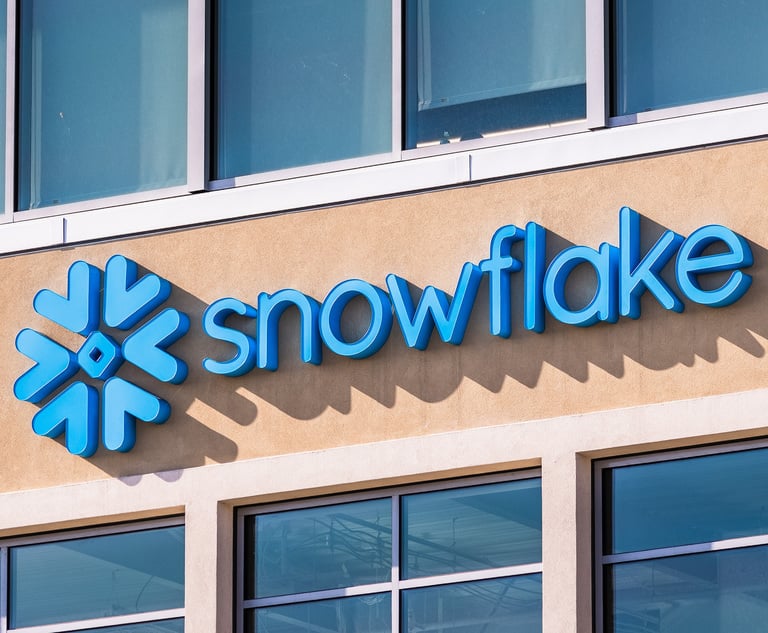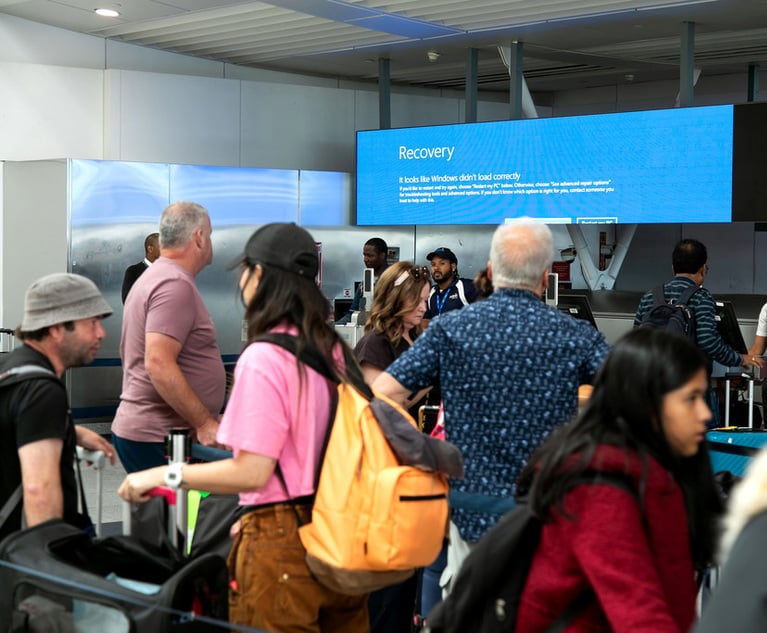 Richard Raysman and Peter Brown
Richard Raysman and Peter BrownTexas Federal Court Produces a Split Decision in Software Development Agreement Dispute
A federal court in Texas recently decided that the progress (or lack thereof) concerning a software development agreement cannot be obscured by allegedly fraudulent statements, nor can breach be excused simply because the developer encounters what it claims as unforeseen technological hurdles. In their Technology Law column, Richard Raysman and Peter Brown discuss the split result reached by the court inasmuch as the court denied the software developer's motion to dismiss the software provider's breach of contract claim and denied in part the provider's fraud claims.
November 08, 2019 at 12:00 PM
6 minute read
The original version of this story was published on New York Law Journal
Setting realistic timelines for development and sale is integral to any successful software-related agreement, whether it be a licensing agreement, services agreement, consulting agreement, or otherwise. It is understandable that deadlines will change and costs will increase, particularly in an ever-changing technological environment. For that reason (among others), statements of work and iterative deliverables are often part and parcel of a software development agreement.
However, as a federal court in Texas recently decided, the progress (or lack thereof) concerning a software development agreement cannot be obscured by allegedly fraudulent statements, nor can breach be excused simply because the developer encounters what it claims as unforeseen technological hurdles. See Polar Pro Filters v. Frogslayer, No. 19-1706 (S.D. Tex. Oct. 22, 2019).
This column focuses on the split result reached by the court inasmuch as the court denied the software developer's motion to dismiss the software provider's breach of contract claim and denied in part the provider's fraud claims.
|Facts and Procedural History
As alleged by its complaint, plaintiff Polar Pro Filters creates and sells software for devices, including drones and smartphones. In August 2017, Polar Pro contacted defendant Frogslayer, a software developer, to explore the joint creation of a video editing program. Frogslayer represented to Polar Pro that it had expertise in video editing and other media-specific businesses.
In October 2017, the parties executed a Software Consulting Agreement (the agreement) wherein Frogslayer would provide Polar Pro "consulting and software development services described in Statements of Work" and an agreed-upon "Roadmap." Frogslayer named the software "The Ripper" and submitted that the project would encompass roughly eight months of work and incur costs of approximately $250,000. In June 2018, Frogslayer informed Polar Pro that "version one of The Ripper project was not close to working," notwithstanding that $235,000 of the estimated costs had been paid. To that end, FrogSlayer's CEO admitted that "hard facts" about the project had not been initially "presented" and, as such, he issued a formal apology. Polar Pro agreed to pay then roughly $100,000 in prospective costs necessary to complete "The Ripper."
After further haggling over the benchmark and functionality of Frogslayer's software, in February 2019, Frogslayer ceased work on the project. allegedly based on Polar Pro's failure to pay the supplemental costs negotiated in June 2018. Moreover, Frogslayer indicated that, to finish the software, it would incur an additional $200,000 to $400,000 in costs and spend six to nine months of work. In turn, Polar Pro alleged that this refusal to continue work contradicted Frogslayer's communications in June 2018 that Frogslayer would absorb the costs of the continued development of the software.
Polar Pro also alleged that the demo of "The Ripper" failed to provide "nearly every element in the 'in scope' section of the Roadmap and also fails to provide most of the features in the 'maybe in scope' section of the Roadmap." Moreover, Polar Pro alleged that the demo "has no commercial value and there is no market in which Polar Pro can sell a defective software to recoup any cost."
Accordingly, Polar Pro sued Frogslayer for, among other causes of action, breach of the agreement, fraud, and breaches of the Texas State Deceptive Trade Practices Act. The fraud causes of action pertained both to Frogslayer's ability to meet the specifications under the agreement and the Roadmap, and the representations of Frogslayer's CEO at the time of the initial issues with development of the software. Frogslayer moved to dismiss for failure to state a claim of breach of contract, and that Polar Pro did not meet the heightened pleading standards for fraud under the Federal Rules of Civil Procedure.
|Legal Analysis and Conclusions
Assuming the facts in Polar Pro's complaint as true, and viewing in the light most favorable to Polar Pro, the court denied Frogslayer's motion to dismiss Polar Pro's breach of contract claim. Specifically, Polar Pro satisfied all four elements for breach of contract under Texas law. First, the parties did not dispute that the agreement was a valid contract. Second, Polar Pro performed its obligations under the agreement by paying the cost estimate and additional roughly $100,000 payment. Third, Frogslayer breached the agreement because it did not produce a program to the specifications set forth in the agreement. Finally, this failure caused Polar Pro harm because it could not market or distribute any software from Frogslayer, irrespective of the time spent and cost expended. In denying the motion to dismiss the breach of contract claim, the court rejected Frogslayer's specific argument that Polar Pro changed the agreement's scope by asking for benchmarks to which "The Ripper" could be compared, as the court concluded this did not relieve Frogslayer of its obligations to perform under the agreement.
Concerning the fraud-based claims, Polar Pro must fulfill Federal Rule of Civil Procedure 9(b), which requires allegations that "state with particularity the circumstances constituting fraud or mistake. Malice, intent, knowledge, and other conditions of a person's mind may be alleged generally." The court concluded that Polar Pro satisfied Rule 9(b), at least at the motion to dismiss stage, when it alleged as fraudulent the June 2018 comments by the CEO of Frogslayer that "hard facts not presented" to Polar Pro, and that Frogslayer would need more time and money to complete the project as "currently envisioned." Specifically, the CEO's claim in June 2018 that Frogslayer would complete the Project, provided that it received additional capital from Polar Pro, was sufficient to state a claim for fraud, irrespective of whether or not the CEO had "not presented" a set of "hard facts."
On the other hand, the court granted the motion to dismiss Polar Pro's fraud claim based on alleged fraud and misrepresentations by Frogslayer around the time of the execution of the agreement and concerning Frogslayer's capabilities to perform the technical tasks specified in the agreement. The court held that Polar Pro did not identify the "who, what, when, where, and how" of the fraudulent statements around the time of the execution of the agreement, as Polar Pro did not identify "who made the alleged statements [and] how it was communicated."
Richard Raysman is a partner at Holland & Knight and Peter Brown is the principal at Peter Brown & Associates. They are co-authors of "Computer Law: Drafting and Negotiating Forms and Agreements" (Law Journal Press).
This content has been archived. It is available through our partners, LexisNexis® and Bloomberg Law.
To view this content, please continue to their sites.
Not a Lexis Subscriber?
Subscribe Now
Not a Bloomberg Law Subscriber?
Subscribe Now
NOT FOR REPRINT
© 2024 ALM Global, LLC, All Rights Reserved. Request academic re-use from www.copyright.com. All other uses, submit a request to [email protected]. For more information visit Asset & Logo Licensing.
You Might Like
View All
Snowflake Faces Avalanche of Federal Lawsuits Over Massive Data Breach

DOJ, 8 State AGs Sue RealPage for Alleged Sherman Act Violations in Algorithmic Pricing Scheme
Trending Stories
- 1Judge Grants Special Counsel's Motion, Dismisses Criminal Case Against Trump Without Prejudice
- 2GEICO, Travelers to Pay NY $11.3M for Cybersecurity Breaches
- 3'Professional Misconduct': Maryland Supreme Court Disbars 86-Year-Old Attorney
- 4Capital Markets Partners Expect IPO Resurgence During Trump Administration
- 5Chief Assistant District Attorney and Litigator Shortlisted for Paulding County Judgeship
Who Got The Work
Michael G. Bongiorno, Andrew Scott Dulberg and Elizabeth E. Driscoll from Wilmer Cutler Pickering Hale and Dorr have stepped in to represent Symbotic Inc., an A.I.-enabled technology platform that focuses on increasing supply chain efficiency, and other defendants in a pending shareholder derivative lawsuit. The case, filed Oct. 2 in Massachusetts District Court by the Brown Law Firm on behalf of Stephen Austen, accuses certain officers and directors of misleading investors in regard to Symbotic's potential for margin growth by failing to disclose that the company was not equipped to timely deploy its systems or manage expenses through project delays. The case, assigned to U.S. District Judge Nathaniel M. Gorton, is 1:24-cv-12522, Austen v. Cohen et al.
Who Got The Work
Edmund Polubinski and Marie Killmond of Davis Polk & Wardwell have entered appearances for data platform software development company MongoDB and other defendants in a pending shareholder derivative lawsuit. The action, filed Oct. 7 in New York Southern District Court by the Brown Law Firm, accuses the company's directors and/or officers of falsely expressing confidence in the company’s restructuring of its sales incentive plan and downplaying the severity of decreases in its upfront commitments. The case is 1:24-cv-07594, Roy v. Ittycheria et al.
Who Got The Work
Amy O. Bruchs and Kurt F. Ellison of Michael Best & Friedrich have entered appearances for Epic Systems Corp. in a pending employment discrimination lawsuit. The suit was filed Sept. 7 in Wisconsin Western District Court by Levine Eisberner LLC and Siri & Glimstad on behalf of a project manager who claims that he was wrongfully terminated after applying for a religious exemption to the defendant's COVID-19 vaccine mandate. The case, assigned to U.S. Magistrate Judge Anita Marie Boor, is 3:24-cv-00630, Secker, Nathan v. Epic Systems Corporation.
Who Got The Work
David X. Sullivan, Thomas J. Finn and Gregory A. Hall from McCarter & English have entered appearances for Sunrun Installation Services in a pending civil rights lawsuit. The complaint was filed Sept. 4 in Connecticut District Court by attorney Robert M. Berke on behalf of former employee George Edward Steins, who was arrested and charged with employing an unregistered home improvement salesperson. The complaint alleges that had Sunrun informed the Connecticut Department of Consumer Protection that the plaintiff's employment had ended in 2017 and that he no longer held Sunrun's home improvement contractor license, he would not have been hit with charges, which were dismissed in May 2024. The case, assigned to U.S. District Judge Jeffrey A. Meyer, is 3:24-cv-01423, Steins v. Sunrun, Inc. et al.
Who Got The Work
Greenberg Traurig shareholder Joshua L. Raskin has entered an appearance for boohoo.com UK Ltd. in a pending patent infringement lawsuit. The suit, filed Sept. 3 in Texas Eastern District Court by Rozier Hardt McDonough on behalf of Alto Dynamics, asserts five patents related to an online shopping platform. The case, assigned to U.S. District Judge Rodney Gilstrap, is 2:24-cv-00719, Alto Dynamics, LLC v. boohoo.com UK Limited.
Featured Firms
Law Offices of Gary Martin Hays & Associates, P.C.
(470) 294-1674
Law Offices of Mark E. Salomone
(857) 444-6468
Smith & Hassler
(713) 739-1250








